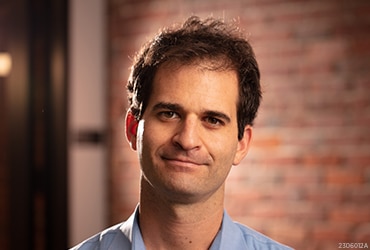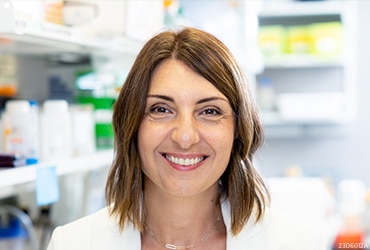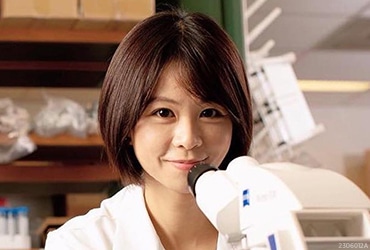Funding the Unconventional: AACR-MPM Oncology Charitable Foundation Transformative Cancer Research Grants
Born through an innovative partnership between the AACR and the UBS Oncology Impact Fund (OIF) managed by MPM Capital, the AACR-MPM Oncology Charitable Foundation Transformative Cancer Research Grants program aims to promote and support creative, paradigm-shifting cancer research which might not be funded through conventional channels. The grants are part of the OIF’s impact program, which provides support for next-generation basic science research.
Each grant offers $400,000 over two years to early and mid-career investigators. Since its launch in 2019, nine grantees with “high-risk, high-reward” research projects have been funded. Four of these grant recipients share the impact of this unique program on their careers and research.

“The AACR-MPM Oncology Charitable Foundation Transformative Cancer Research Grant provided me the freedom to conduct functional genomic screens which are generally not supported by traditional funding mechanisms given their exploratory nature,” said Liron Bar-Peled, PhD, who was awarded one of the inaugural AACR-MPM Oncology Charitable Foundation Transformative Cancer Research Grants in 2019 for his project, Deciphering the mechanisms of ferroptosis in signaling and death in cancer.
Dr. Bar-Peled and his colleagues used these functional genomic screens to uncover a pathway by which cancer cells detect reactive oxidative species (ROS), in a study recently published in Cell. Explaining the implications of this, he said, “Some chemotherapies kill cancer cells in part by causing oxidative stress. We believe that this nuclear-to-mitochondria ROS sensing pathway may play an important role in mediating resistance to a specific class of chemotherapies known as platinum-based therapies which are commonly used in the treatment of ovarian cancers.” Dr. Bar-Peled, who is an assistant professor at Massachusetts General Hospital, also added, “Receiving the AACR-MPM Oncology Charitable Foundation Transformative Cancer Research Grant was a massive help to my career as it launched this project, which resulted in some of the first publications in our lab and has spurred two major research initiatives!”

Robert Eil, MD, an assistant professor in the Division of Oncology, Oregon Health and Science University was awarded the AACR-MPM Oncology Charitable Foundation Transformative Cancer Research Grant in 2020. “The AACR-MPM Oncology Charitable Foundation Transformative Cancer Research Grant allowed me to accelerate the development of my lab,” he said, adding that “After opening my lab, I needed to hire staff and validate several models from scratch with junior personnel during the height of the COVID-19 pandemic. Thanks to this support, I was able to move rapidly through development and validation of several mouse models of cancer. We now have some exciting preliminary data that is currently under peer review and is the basis for an R01 application.”
Explaining his research project, Targeting the ionic checkpoint on T cell antitumor function, Dr. Eil said,“Recent breakthroughs in the field of cancer immunotherapy rely upon the function of ‘killer’ T cells, a type of immune cell. While some patients have been ‘cured’ of widespread disease, many patients do not respond. We found that in aggressive solid cancers, liver cancers included, there is a severe electrolyte imbalance that inhibits the specialized functions of these T cells. The project the AACR-MPM Oncology Charitable Foundation Transformative Cancer Research Grant supported focused on using genetic engineering techniques to instruct T cells how to function in the challenging ‘ionic’ environment within tumors.” Dr. Eil and his colleagues recently shared some of their findings at the AACR Annual Meeting 2023.
He went on to say, “The AACR-MPM Oncology Charitable Foundation Transformative Cancer Research Grant was the first external vote of confidence for my career pathway after starting my independent laboratory after I finished clinical training. Physician-scientists, and in particular surgeon-scientists, are both too rare and under-leveraged. We have made tremendous progress in learning about cancer over the last 30 years, but for many patients that hasn’t translated into improved survival. This award allowed me to bring this project closer to applying it to patients, along with providing room for the growth of other translational projects that are the basis for new cellular therapies to treat metastatic solid cancers.”

In 2021, Eirini Papapetrou, MD, PhD was awarded the AACR-MPM Oncology Charitable Foundation Transformative Cancer Research Grant while an associate professor at Icahn School of Medicine, Mount Sinai. “The AACR-MPM Oncology Charitable Foundation Transformative Cancer Research Grant gave us research support early during the development of a new project, which was centered around a new target that we had recently discovered for myeloid malignancies – blood cancers, such as myelodysplastic syndrome (MDS) and acute myeloid leukemia (AML),” she said.
Dr. Papapetrou’s project, G-protein signaling a novel target for slicing factor-mutant cancers, investigated a promising therapeutic target for a subset of MDS and AML that harbor mutations in splicing factor genes. “We found that these mutations at least in part cause MDS by increasing a long form of a protein that communicates signals to cells. The goal of this project is to evaluate if targeting this protein, called G⍺s, by degrading it or by inhibiting its effects, would yield therapeutic benefit in cellular and animal models of MDS and AML, as well as in cells from patients with MDS and AML,” explained Dr. Papapetrou.
“Receiving the AACR-MPM Oncology Charitable Foundation Transformative Cancer Research Grant allowed us to advance our studies, collect more evidence of therapeutic promise of our target, G⍺s, encoded by the gene GNAS, and subsequently obtain a larger 5-year NIH R01 award from the NCI that will ensure this research continues past the AACR award,” Dr. Papapetrou said. She added, “This prestigious award advanced my research, as well as my career. I have since been promoted to the rank of full Professor and became the founding Director of a new Center in my academic institute, the Center for Advancement of Blood Cancer Therapies at the Icahn School of Medicine at Mount Sinai. We are committed to continued pioneering research and developing breakthrough treatments for blood cancer patients.”

Iok In Christine Chio, PhD, was also awarded the AACR-MPM Oncology Charitable Foundation Transformative Cancer Research Grant in 2021. Dr. Chio’s project Redox-based strategies for pancreatic cancer early detection, is focused on identifying a biomarker of pancreatic ductal adenocarcinoma (PDA) to improve early detection of the disease. “Much like finding a specific fingerprint at a crime scene, we’re looking for a telltale sign of PDA in the body. This sign is linked to a mutation found in more than 95% of PDA cases that causes the body to produce specific chemical changes, or ‘oxidation products.’ Our team has discovered that one such product is particularly stable and enriched in PDA cells,” Dr. Chio said, explaining, “By using sophisticated chemical tools and samples from patients and mouse models, we aim to identify these oxidation products that can help distinguish PDA from non-cancerous conditions. Our work could pave the way for new diagnostic tools and contribute to the development of early detection and treatment strategies for this deadly disease.”
An assistant professor at Columbia University, Dr. Chio went on to say, “The financial support from the AACR-MPM Oncology Charitable Foundation Transformative Cancer Research Grant has allowed us to gather a dedicated team, access cutting-edge resources, and collaborate with leading experts, thereby enriching our research and facilitating exploration into novel areas that would have been financially constrained otherwise.” She also added, “The grant’s emphasis on diversity has allowed me to provide invaluable training opportunities to a diverse team, fostering an inclusive and collaborative research environment. In essence, this grant has not only shaped my personal career trajectory, empowering me to push boundaries and broaden my research scope, but it has also contributed to the collective effort in the broader field of cancer research. Overall, this grant is not just a financial resource; it’s a catalyst that is driving forward our research, with the potential to significantly impact the global fight against cancer.”